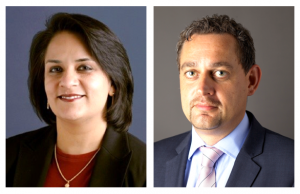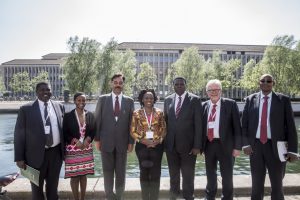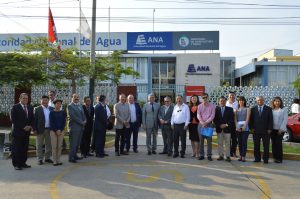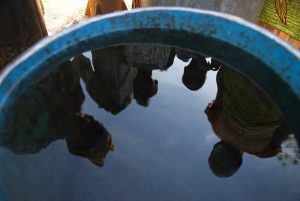Transitioning for scale and impact

January 2018 will mark a new phase for 2030 WRG as the program moves from IFC to the World Bank Water Global Practice (Water GP). The strategic decision has been made by the 2030 WRG Governing Council to accommodate opportunities for larger scale impact as the program is set to expand its operations. 2030 WRG Steering Board Co-Chairs Dominic Waughray and Jyoti Shukla shared some thoughts on this development.
“2030 WRG challenges how stakeholders across all sectors engage and collaborate in the water space,” Dominic said. “It is a positive innovation that brings together the public and private sectors as well as civil society organizations (CSOs).”
Jyoti added: “The Water GP is very excited about this transition. We will be looking at approaches for each program and intervention to develop sustainably at scale. Both an opportunity and a challenge, we will build upon the wonderful work that has been done in the past 6 years, during which the program was given the opportunity to mature and grow at IFC, after its initial incubation period at the World Economic Forum.”
Vision and Leadership

Kenya 2030 WRG partners attending the Global Green Growth Forum in Denmark, June 2016.
Dominic and Jyoti both acknowledged the 2030 WRG partners and thanked them for their vision, commitment, and leadership to embark on this innovative collaboration back when it was merely an idea. It has not been a journey void of challenges as the program engaged partners who would not normally have been at the same table constructively debating water issues and co-designing public-private solutions. “The result is the tremendous impact we are already making in the countries and the potential it has to grow at a global scale. With the transition to the Water GP and its extended network there is an opportunity to scale impact in existing country partnerships and reach out to many more countries and stakeholders,” Dominic added.
Jyoti elaborated: “Typically, the Water GP engages in global and regional partnerships with governments, CSOs and other related development partners. 2030 WRG adds tremendous value to the Practice as there is now an opportunity to bring in more private sector partners to the mix. The World Bank’s main instruments include lending support through IBRD and IDA, policy dialogue and providing technical assistance to governments on legal and regulatory frameworks. We are now creating the capacity to mobilize the expertise of the private sector, including commercial financing approaches that reach the poor and are environmentally and socially inclusive and sustainable. The transition now to the Water GP is an important next step for 2030 WRG. It will be a natural development to find synergies and collaboration with the largest concentration of the world’s water experts that work within the Water GP.”
The World Bank’s water portfolio currently covers 175 projects worth US$27 billion in lending and technical expertise. Around 70% of lending is for services such as water supply and sanitation and irrigation projects. Since 2014, lending for water resources management has also shown rapid growth, rising to 30% of the portfolio in 2017. In addition, projects with a water sector-related component managed by other World Bank global practices total approximately $10 billion, meaning the Bank’s total water-related investments are $37 billion.
Impact

2030 WRG Peru Mongolia Water and Mining Exchange. April, 2017
“Country-level success has been demonstrated in many of our MSPs,” Dominic said. “Part of 2030 WRG’s impact and success is its ability to break through silos – when an important platform on water in a country is co-hosted by a minister and a private sector representative who is knowledgeable on the topic. When on that same platform civil society partners, academics, and a range of other actors are welcomed to openly discuss plans to grow the economy within the constraints that water has to offer. In Peru, South Africa, and Mongolia to name a few interventions, practical plans have emerged from those platforms. This model has emerged as a reliable and effective approach to integrate business with sustainable water resources management and can be replicated now in other countries.”
Jyoti concurred and added: “As water is increasingly becoming a scarce, economic and political commodity it is extremely important for all stakeholders to come together to discuss alternative uses of water, contribute to water policy and water resource management interventions. This balances out competing demands more successfully. When there is a common understanding and a willingness to understand each other’s perspectives, this will translate into policies and interventions that may change the way water resources are managed on the ground.”
Innovation
Dominic suggested the role of technology as one potential avenue to continue innovating within the MSPs, particularly when it comes to measuring and scaling impact “Perhaps we can draw in more ideas from science and technology innovators to help countries improve their water resources management and monitoring capabilities. This will help us find additional ways to iterate and refine our engagements, while ensuring that the lessons we learning along the way are incorporated into the decision-making processes. It is heartening to see attribution of our work in the water resource space and I am eager to learn how, jointly with the Water GP, 2030 WRG can do an even better job of demonstrating its impact in the long run.”
Message for partners

Reflection in water tank. Ghana. Photo: © Arne Hoel / World Bank
Jyoti and Dominic welcomed all new partners who recognize that collaboration in the MSP domain is key to addressing water resources challenges. They also acknowledged that given the program’s ambition to scale up, new partners and sources of funding will naturally be needed to achieve 2030 WRG’s continued success and maximize impact. “New stakeholders have the opportunity to join an initiative that, several years into its delivery, is now maturing into an extended network, enriched with tremendous sector expertise” Dominic said. “To our current network of partners of high-level government officials, companies and CSOs, I would like to encourage them to reach out to their peers and share their 2030 WRG experience, including advice and guidance to those who are embarking on this 2030 WRG model of collaboration. Peer-to-peer flow of knowledge is key.” Jyoti added: “It is really time for the water sector to move away from augmenting supply to putting the efficient management of water resources at the heart of the water agenda. Achieving the SDGs will be quite a daunting challenge and it requires all parties to work together towards this common goal.
——————
Dominic Waughray is Head of Public-Private Partnership, Member of the Executive Committee at the World Economic Forum in Geneva and Jyoti Shukla is Director of the Water Global Practice at the World Bank Group in Washington DC.
Both Dominic and Jyoti have expressed their heartfelt thanks to the Governing Council and Steering Board members for their dedication and unwavering support all these years. The program’s success and impact is reflected in their continued commitment.
